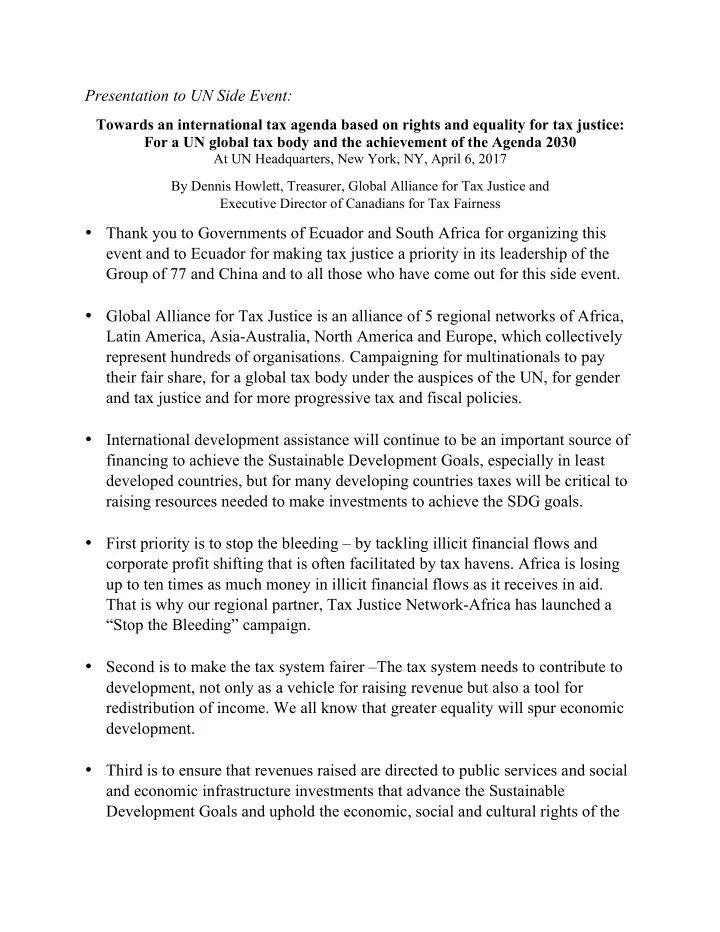

Presentation to UN Side Event: Towards an international tax agenda based on rights and equality for tax justice: For a UN global tax body and the achievement of the Agenda 2030 At UN Headquarters, New York, NY, April 6, 2017 By Dennis Howlett, Treasurer, Global Alliance for Tax Justice and Executive Director of Canadians for Tax Fairness • Thank you to Governments of Ecuador and South Africa for organizing this event and to Ecuador for making tax justice a priority in its leadership of the Group of 77 and China and to all those who have come out for this side event. • Global Alliance for Tax Justice is an alliance of 5 regional networks of Africa, Latin America, Asia-Australia, North America and Europe, which collectively represent hundreds of organisations . Campaigning for multinationals to pay their fair share, for a global tax body under the auspices of the UN, for gender and tax justice and for more progressive tax and fiscal policies. • International development assistance will continue to be an important source of financing to achieve the Sustainable Development Goals, especially in least developed countries, but for many developing countries taxes will be critical to raising resources needed to make investments to achieve the SDG goals. • First priority is to stop the bleeding – by tackling illicit financial flows and corporate profit shifting that is often facilitated by tax havens. Africa is losing up to ten times as much money in illicit financial flows as it receives in aid. That is why our regional partner, Tax Justice Network-Africa has launched a “Stop the Bleeding” campaign. • Second is to make the tax system fairer –The tax system needs to contribute to development, not only as a vehicle for raising revenue but also a tool for redistribution of income. We all know that greater equality will spur economic development. • Third is to ensure that revenues raised are directed to public services and social and economic infrastructure investments that advance the Sustainable Development Goals and uphold the economic, social and cultural rights of the
2 people. • Some progress has been made on Tackling Tax Havens in the last few years but we have not gone far enough and international cooperation in curbing tax havens is in danger of stalling or going backwards. • OECD/G20 BEPS project has produced some limited advances, especially country by country reporting and automatic information exchange, which could help tax authorities determine if multinational corporations are paying their fair share of taxes. • But there is a serious shortcoming in that the full benefits of these measures will not be available to many medium and smaller developing countries who do not have the capacity to effectively use this information. This demonstrates the fundamental problem with continuing to rely on a rich country club, the OECD, to determine the global corporate tax rules, without the effective participation of developing countries in the decision making about those rules, even if they are invited to participate in implementation of them after they have been decided. • That is why the Global Alliance for Tax Justice is calling for the creation of a global tax body under the auspices of the UN to take the lead on the fight against tax havens and for transparency. • Achieving the SDGs requires respect for human rights and policies that address inequality – which undermines economic health. Tax systems need to be designed to help redistribute wealth. Many countries rely too much on value added taxes which are regressive. Progressive income taxes and ensuring multinational corporations pay their fair share of taxes is crucial. I acknowledge that these forms of taxation are more complex and difficult to implement. But this is why developed country international development assistance programs need to increase their technical assistance for developing country tax authorities. • We also need more funding for the UN Tax Committee of Experts so that developing countries are able to get help in crafting fairer and more effective tax regimes, not just implement inadequate or inappropriate tax policies
3 developed by the OECD. • Fair taxes need to be linked to fiscal policies that put a priority on investments in public services such as health and education that are gender sensitive and will help to achieve the SDGs. • Finally as a Canadian, I would like to note that tax haven related tax evasion harms developed countries as well. Canadians for Tax Fairness has estimated that Canada loses $8 billion each year due to tax haven facilitated tax evasion and avoidance. • Leadership of the G of 77 on tax haven and tax justice issue is welcome as developing countries suffer proportionately more damage to their economies as a result of tax haven abuse. But developed countries also share a common interest on this issue, and I am optimistic that at least some developed countries can be convinced to step up their efforts in addressing tax haven issues. • The Canadian government has made action on tax havens a priority for their tax authority and have begun implementing many of our recommendations. Canadian civil society organizations such as Canadians for Tax Fairness will continue to press the government to become more involved in international efforts on tax justice and we are calling on Canada to be a champion for developing country interests in tax matters.
Recommend
More recommend